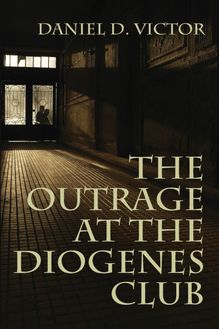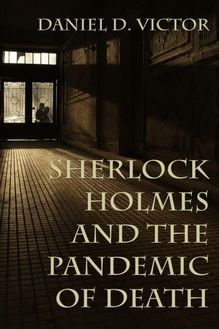Sherlock Holmes and The Baron of Brede Place , livre ebook
102
pages
English
Ebooks
2015
Vous pourrez modifier la taille du texte de cet ouvrage
Obtenez un accès à la bibliothèque pour le consulter en ligne En savoir plus
Découvre YouScribe et accède à tout notre catalogue !
Découvre YouScribe et accède à tout notre catalogue !
102
pages
English
Ebooks
2015
Vous pourrez modifier la taille du texte de cet ouvrage
Obtenez un accès à la bibliothèque pour le consulter en ligne En savoir plus
Publié par
Date de parution
21 juillet 2015
Nombre de lectures
0
EAN13
9781780927749
Langue
English
Title Page
SHERLOCK HOLMES AND THE BARON OF BREDE PLACE
[Being a manuscript found in the tin dispatch-box of
Dr. John H. Watson in the vault of
Cox & Co, Charing Cross, London]
Book Two in the series,
Sherlock Holmes and the American Literati
as edited by
Daniel D. Victor, Ph.D.
Publisher Information
First edition published in 2015 by
MX Publishing
335 Princess Park Manor,
Royal Drive, London, N11 3GX
www.mxpublishing.co.uk
Digital edition converted and distributed by
Andrews UK Limited
www.andrewsuk.com
© Copyright 2015 Daniel D. Victor
The right of Daniel D. Victor to be identified as the author of this work has been asserted by him in accordance with the Copyright, Designs and Patents Act 1998.
All rights reserved. No reproduction, copy or transmission of this publication may be made without express prior written permission. No paragraph of this publication may be reproduced, copied or transmitted except with express prior written permission or in accordance with the provisions of the Copyright Act 1956 (as amended). Any person who commits any unauthorised act in relation to this publication may be liable to criminal prosecution and civil claims for damage.
All characters appearing in this work are fictitious. Any resemblance to real persons, living or dead, is purely coincidental. The opinions expressed herein are those of the authors and not of MX Publishing.
Cover design by www.staunch.com
Acknowledgements
For their patience and help, many thanks are once again in order to Sandy Cohen, Barry Smolin, Ethan Victor, Seth Victor, and my wife Norma Silverman. Without their support, the newly discovered manuscript of Dr. Watson would have remained hidden forever.
Dedication
Here’s another for Norma, Seth, and Ethan
Quotes
Watson’s accounts are as remarkable for those cases that they omit as they are for the ones that they relate... . Much of Holmes’ work as an in-house detective to the English upper classes in the 1880s and 1890s has gone unrecorded, the victim of Watson’s discreet censorship.
-Nick Rennison
Sherlock Holmes:
The Unauthorized Biography
If in telling the story I seem to be somewhat vague in certain details, the public will readily understand that there is an excellent reason for my reticence.
-John H. Watson, M.D.
“The Adventure of the Second Stain”
Some of this story is true.
-Paul Ferris
Headnote, Cora Cran e
Preface
In the many years that I have narrated the adventures of my friend and colleague, Mr. Sherlock Holmes, I have always appreciated the forgiving nature of my readers. They have understood that the occasional alterations I’ve made to the historical record - excluding those cases Holmes has asked me to disguise or omit altogether - represent my best efforts to shield not only the identities but also the sensibilities of the guiltless personages involved. Even in those rare instances when I employed manipulation to swell a scene or render some action more engaging, a tolerant public generally turned the proverbial blind eye.
Yet even the best intentioned of authors can go too far, myself included. As difficult as it is for me to admit, the case I titled “The Adventure of Charles Augustus Milverton” serves as the most egregious example. Since the narrative first appeared in The Strand in 1904, it’s taken me more than twenty years to summon the strength to set the record straight, to report the full extent of the emotional pain and cold-hearted criminality that I neglected to set down as I should have from the start.
Me a culpa .
To be fair, one cannot say, however, that I didn’t offer hints of my obfuscation. Far from it. In the opening paragraph of the original narrative, I admitted to a “suppression” of certain details and even announced to the reader that I had intentionally concealed “any fact by which he might trace the actual occurrence”. Not that I expected such candour to stifle the harshest of my critics. For them, my confessions served only to raise new questions about what other facts I had distorted or failed to record. My detractors cited vague descriptions, inaccurate dates, and inconsistent characterizations often enough that many in the general audience began to doubt my oft-stated devotion to Truth.
The criticism has stung, and I am prepared to begin anew. With so long an interval having elapsed and so many lives having passed since I penned my initial account of the Milverton affair, I believe it is high time to correct the public record. As the following narrative will reveal, the long arm of the odious blackmailer, whom Holmes once called “the worst man in London”, stretched far beyond the capital’s boundaries, far beyond the shores of England. Because even America fell under Milverton’s shadow, there exists a poetic justice in defending my apologia with the words of Supreme Court Justice Louis D. Brandeis. “Sunlight,” he famously observed, “is said to be the best of disinfectants.”
Such a belief has always guided me in making public the adventures of Sherlock Holmes. Howsoever far I may have strayed from the concept in my original narrative about Milverton, howsoever much I may have distorted and concealed, I still remain committed to Brandeis’ premise. It is a commitment that has compelled me to resurrect with greater honesty the insidious crimes perpetrated by Milverton and - even worse - the emotional consequences that accompanied them.
John H. Watson, M.D.,
London 1927
Part I
The Americans
Chapter One
I stood upon a high place,
And saw, below, many devils
Running, leaping,
And carousing in sin.
One looked up, grinning,
And said: “Comrade! Brother!
-Stephen Crane
“Are you familiar with the American writer named Stephen Crane?”
It was a hot July afternoon in 1898, and I was returning to our rooms in Baker Street from a mid-day luncheon at my club. No sooner had I entered the sitting room than I heard the preceding question put to my friend, Sherlock Holmes. The voice was hoarse; the accent, American.
“Ah, Watson,” exclaimed Holmes, “just in time. May I present to you Mr. Harold Frederic, the acclaimed novelist and London correspondent for the New York Times . He wants me to help him solve a problem.”
Both men rose to greet me, and I was immediately impressed by our guest’s imposing size. He was a giant of a man, his height eclipsing the tall, lean form of Sherlock Holmes, who was rather over six feet himself. Broad-shouldered with thick dark hair and a walrus moustache, Frederic gave the impression of one who was quite prepared for action. Indeed, his dark business suit appeared large enough to enable someone of his bulk to move about quite freely. He didn’t look like a man accustomed to asking for help.
Given the heat then, I wasn’t surprised at how much Mr. Frederic was perspiring. Yet I also couldn’t help noting the effort, accompanied by an inhalation of breath and a punctuating grunt, that he exerted in order to stand. Admittedly, the armchair he’d occupied had deep cushions, but as a physician I knew that a man of his relative youth should not find rising so difficult.
“Whatever you wish to say to me,” Holmes informed our guest, “you may say to Dr. Watson. He and I have worked together on many a perplexing problem.”
“Yes, yes,” said Frederic, waving Holmes off. “The two of you are quite well-known among us pressmen.” He turned to face me. “Dr. Watson,” he said and, catching his breath, extended a hand - a large paw might be a better term for it. “It seems hard to believe that I’ve been writing for the New York Times here in London for close to fifteen years, and yet this is the first time I’ve actually met you and Mr. Holmes.”
“You don’t live nearby, I take it,” said I, shaking his hand. “If you did, our paths might more easily have crossed.”
“No,” Frederic smiled between his huffs and puffs. “I live just south of Croydon. We have a beautiful residence there called Homefield. Lots of trees. Rustic setting. Quite different from all the mysterious activities that I can guess go on here at Baker Street.”
The big man paused to stroke his chin and catch his breath again. Perhaps his discomfort seemed more noticeable to me because I am a doctor; but one needn’t have been a medical man to observe the flutter of his eyelids and the pauses in his speech.
“What’s funny, Doctor,” said he, “is that I’ve read so many of the cases you’ve recorded... that I feel as if I’ve known the two of you right along.”
To my great embarrassment, I couldn’t return the compliment. Although I knew of Mr. Frederic’s works, I had to confess that I hadn’t read any of them, not even his best-selling novel, Illumination.
Frederic took another short breath and tried again. “Perhaps you know the book by its name in the States, The Damnation of Theron Ware .”
I remained in the dark, but Holmes surprised me by interjecting, “A most apt treatise on religious hypocrisy, Watson. I highly recommend it.”
Our visitor nodded in appreciation while I was left to wonder. Generally speaking, Holmes revealed little interest in fiction.
“Now, Mr. Frederic,” said he, “let us return to the problem that brought you here.” Holmes indicated that we be seated, and Frederic appeared all too ready to sink back into the soft chair.
“Stephen Crane, Mr. Holmes. Before Dr. Watson’s arrival, I was asking if you’ve ever heard of him?”
“The author of The Red Badge of Courage ? What member of the reading public is not familiar with that small but grand account of a Union soldier in the American Civil War? If I am not mistaken, so accurate are his desc



